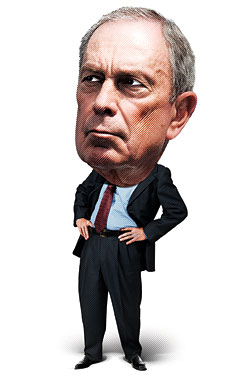
September 2, 2013: Labor Day in New York. The Democratic mayoral primary is eight days away, and down in Washington, President Mitt Romney and House Majority Leader Eric Cantor commemorate the holiday by announcing legislation banning labor unions. This hands the city’s candidates a golden opportunity for outrage. Just before he steps onto Fifth Avenue at the head of the Labor Day Parade, Bill de Blasio pledges that if he’s elected mayor, he will require every city business, even hot-dog carts, to hire one union member for each nonunion employee.
Christine Quinn is holding a press conference at ground zero praising LGBT ironworkers—and promising that as mayor she will appoint Ray Kelly police commissioner for life. When reporters ask Quinn if this is another blatant pander to the business community, she says something about the wisdom of her 86-year-old dad and dashes to the parade.
Scott Stringer is doing some pre-parade leafleting on the Upper West Side, his home turf. Yesterday, a campaign volunteer tried to draw attention to Scarlett Johansson’s endorsement of Stringer by leaking new naked cell phone photos of the actress—but pushed the wrong button and leaked naked photos of another Stringer backer, Congressman Jerry Nadler.
John Liu is marching in eighteen parades. During one in Flushing, a supporter hands Liu campaign-donation-disclosure forms. “I sped things up by signing all 888,” the man says. “Hope that’s okay!”
No one is sure of Bill Thompson’s plans. Four years ago, Thompson ran a low-profile campaign and nearly won, so he’s using the same playbook this time around. Today reporters suddenly receive a text: “Bill xing 72 street.” Sure enough, the genial candidate is smiling and waving—just as the parade disperses.
And longshot Tom Allon declares residency in Zuccotti Park, where Occupy Wall Street is now in its 24th month.
Down in Bermuda, Mike Bloomberg is on the twelfth tee of the Bloomberg Pines Country Club course when his cell phone rings. It’s Kevin Sheekey, the mayor’s mischievous political strategist. This morning’s latest Quinnipiac-Marist-Siena-NY1-Zagat poll showed the race coming down to the wire … sort of: It’s Thompson 17, Quinn 16, De Blasio 15, Liu 14, Stringer 12, Allon 2—and undecided 23 percent. “What if,” Sheekey says, “you tell Quinn you will bankroll all the ballot security she needs to win—and in exchange she declares an economic emergency and names you financial czar? Then when Romney runs for reelection in 2016, the country will be clamoring for a real independent, and—”
Bloomberg hangs up. Tees up. Crazy Sheekey. Then again …
Okay, probably not. But less than two years from New York’s next mayoral race, the uncertainties outnumber the sure things: The field is unsettled, the issues are sketchy—even the month of the crucial Democratic primary isn’t determined. Six prospective candidates aren’t waiting for the schedule to be finalized. They’re feverishly chasing donors and showing up at every community-group meeting of more than five citizens. The first TV ad for a 2013 candidate will hit the airwaves next week. Scandal has already claimed the early favorite (Anthony Weiner) and damaged a second contender (John Liu). Business leaders are trolling for an outsider to back.
The one certainty about the 2013 race is that it will be a referendum on Michael Bloomberg’s New York. For twelve years, the mayor’s vision of the city as a “luxury product” has dominated New York life. The city might be growing ever more expensive, Bloomberg argued, but we’d be worth it, with our highly educated workforce attracting new businesses and our stadiums, museums, and bike lanes luring tourists. Some aspects of Bloombergism have been resounding successes: Crime has stayed at historic lows, public-school funding soared, and the city’s budget has been relatively stable in a time of wild swings in the larger economy. Yet below the surface enormous problems await the next mayor. The Police Department’s anti-terrorism responsibilities and shrinking head count have stretched it thin; anger at the use of stop-and-frisk tactics has reached the boiling point. The quality of public education is wildly uneven; the mania for standardized testing has produced distrust of the resulting data instead of measurably smarter kids. The city’s unemployment numbers are slightly better than the national averages, though the greatest gains in jobs have come in low-income sectors. Yes, tourists have flocked to Broadway, but the city remains overly dependent on Wall Street for tax revenue. New York has always been a city of extremes, but the percentage of households with annual incomes of $200,000 or higher has nearly doubled since 2000, while the percentage of renters paying more than 35 percent of their incomes toward housing has ballooned to 44 percent and the share of New Yorkers living below the poverty line—about 20 percent—hasn’t budged.
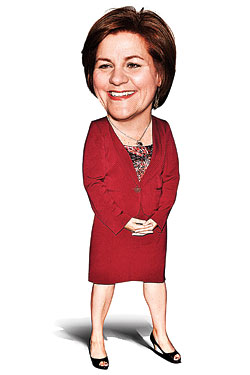
Photo-illustration by DarrowPhoto: Henry S. Dziekan III/Getty Images (Quinn head); Joe Corrigan/Getty Images (Quinn body)
The Bloomberg era has also had a profound impact on the city’s political culture. There’s a surplus of political hot air in New York, but our political muscles have atrophied in the past decade as the mayor’s money has muted dissent. For the past twelve years, there really hasn’t been a potent racial or ideological politics. Voter apathy has worsened, with just 26 percent bothering to show up in 2009.
Things might be about to change. The next mayor’s race will take place against a backdrop of economic anxiety the city hasn’t seen since the seventies. The scramble for votes might produce creative policy ideas and innovative coalition-building—or it might encourage a dispiritingly fragmented appeal to narrow ethnic and geographic bases. Voters aren’t paying much attention yet; some of the likely candidates are unwilling to admit they’re running, and none is fully prepared to roll out his or her own vision of a post-Bloomberg city. But the fight is on.
The real world can be stranger than an imagined one. At the El Caribe Country Club in Mill Basin, a trumpeter enters, dressed like a Medieval Times extra: floppy black beret, crimson-and-pale-blue cape, incongruous black wingtips. His horn, playing a tune that’s a combination of Renaissance Faire and post time at Aqueduct, startles the breakfast crowd. Thirty Brooklyn bank executives, religious leaders, and real-estate salesmen march in—plus one woman. The boys are being anointed “Kings of Kings County” by the publisher of a chain of community newspapers. The token girl, Christine Quinn, is Woman of the Year.
She has had a good one in many ways. Quinn, the highest-ranking openly gay elected official in the state, became a prominent part of Governor Andrew Cuomo’s successful springtime push to legalize same-sex marriage, scoring points with the network of donors behind the effort. Her odds of moving up from City Council speaker to mayor got a bigger boost when the 2013 front-runner, former congressman Anthony Weiner, destroyed his own political career with a sexting scandal. She has been pursuing Weiner’s outer-borough, white ethnic base ever since. In September, she hired Joel Benenson, the pollster who’d helped craft Weiner’s appeal to middle-class voters in the 2005 Democratic mayoral primary before helping elect Barack Obama president in 2008. “The Benenson hiring was interesting to me, because it says she’s definitely going after that Weiner vote, that Queens-Brooklyn Ed Koch vote,” a Democratic strategist says. “But how does Quinn tap into that Everywoman-Everyman vote while still being the favorite candidate of the Real Estate Board?”
Bloomberg’s vision of the city as a “luxury product” has dominated New York life.
Quinn’s best asset in trying to pull off that balancing act between being the candidate of the business community and of regular folks is her personality. One October morning, the red-haired 45-year-old sits down for coffee in a restaurant three blocks from City Hall and launches into a story about her favorite waiter at the Moonstruck Diner in Chelsea, part of the district Quinn represents in the City Council. She’s at once endearingly motherly and shrewdly sharp-elbowed, describing how the waiter gives her a reading on street-level opinion in his Jackson Heights neighborhood. “I’d love to think by 2013 the economy will be great and we’ll have tons of money in the budget,” she says. “There’s nothing to indicate a miraculous turnaround. So the race should be about who has real ideas to keep jobs, create jobs, to balance the budget in a way that keeps core services, a budget that’s honest and real that doesn’t make pie-in-the-sky promises.”
Quinn laughs loudly and curses fluently, but she can be a maddeningly cautious politician, claiming, for instance, that she still hasn’t made up her mind whether the “living wage” concept is a good or bad idea for New York. She’d like to see public schools add universal, full-day prekindergarten and reduce overcrowding but doesn’t envision any radical change of course. “I don’t think it’s worthwhile to spend a lot of time obsessing about the stats and how they’re manipulated,” Quinn says. “[The schools] are just not where they should be—period, end of conversation. Wholesale moving away from testing is not something that’s ever gonna happen. But you do want to give schools the ability to actually teach in a way that’s creative and gets the message across.” Quinn says she’d continue the NYPD’s controversial stop-and-frisk tactic but order the department to scrub from its files the names of citizens who haven’t been charged with a crime.
When and if her campaign becomes official, Quinn’s opponents will try to paint her as the mayor’s pet. “She’s in every picture with him,” a potential rival says. “The hurricane—why is the speaker of the City Council in the picture? Peter Vallone and Rudy Giuliani worked together, but Vallone wasn’t standing next to Giuliani at every event. And extending term limits—it was his idea, but she implemented it.” Quinn’s team comforts itself with poll numbers that show Bloomberg with a 57 percent approval rating among Democrats, even after the Cathie Black, snowstorm, and CityTime debacles. And Bloomberg fatigue may well be overrated, especially outside the city’s media-intelligentsia complex. “The perception in the business community is that Bloomberg has done a great job,” says Kevin Ryan, the co-founder of DoubleClick who now runs the Gilt Groupe luxury-goods website. “Although it’s easier to write about how things should be dramatically different, I don’t think that’s the case. The schools are a problem, but in the last twenty years, the quality of life has gotten better, crime has gotten better, the subway system is better. And we need to continue on that path.”
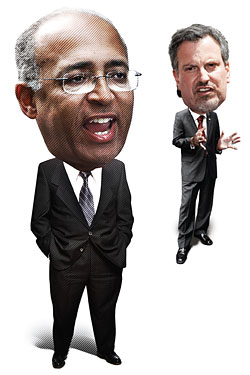
Photo-illustration by DarrowPhoto: Mario Tama/Getty Images (Thompson head); Stewart Cohen/Getty Images (Thompson body); Jemal Countess/Getty Images (De Blasio head, De Blasio body)
Disowning Bloomberg now would be impossible for Quinn, even if she wanted to. She’s quick to list issues where she’s differed with the mayor, but she’s also doubling down on her bid to be Bloomberg’s heir. “Whoever the next mayor is should do everything they can to keep Ray Kelly the police commissioner,” she tells me. “He’s done an extraordinary job.” But even Kelly’s crop-duster-blasting missiles won’t be able to protect Quinn if Bloomberg’s third term continues to unravel.
Two hours later and two blocks east, Bill Thompson walks into an Italian restaurant. Not a single head turns. There are no welcoming shouts of “Billy!” Thompson has been in public life for more than 30 years and has won election to citywide office twice; two years ago, he nearly pulled off a shocking upset, losing to Bloomberg’s $108 million reelection campaign by just four points. He is smart and adult. Mr. Excitement he is not.
Yet Thompson, the former city comptroller, will be a formidable player in the 2013 contest, if only because of race: He will probably be the single person of color running in a Democratic primary that is increasingly dominated by black and brown voters. “Thompson has a huge advantage,” says a strategist close to the city’s politically potent labor unions. “Not just because minority voters in general will vote for him, but because union membership is largely minority, and they won’t endorse a white candidate if there’s a minority candidate in the race.”
Which is certainly how the calculations have played out in the past. Thompson, 58, will have serious competition from De Blasio and Quinn for union support, and knows he can’t simply coast to City Hall, especially because he has been off the radar so long, passing up every opportunity to take shots at Bloomberg. “Everybody expects me to be the Bloomberg critic. I don’t think that serves me well,” Thompson tells me over a bowl of split-pea soup. “I don’t want to be the bitter guy from ’09. This isn’t about ’09. The next election is about ’13. I think New York City wants a mayor who represents all five boroughs, and you haven’t had that since Mike’s first term. That will be the difference in 2013. Represent us. Understand us. Stand up for us, dammit. And I don’t think they’ve gotten that in a while.”
Thompson does have distinct policy differences with Bloomberg, but even the contrasts somehow come out anodyne. “If we’re really trying to change the school system and make sure children are better prepared, that they are more competitive, how do we go about it?” Thompson says. “You’re going to have discussions in the next campaign about curriculum, but also about the issues of comprehension and critical thinking. How do we do that better? I think it is letting teachers have more of a chance to teach. I talked about stop-and-frisk in ’09. It is a valuable police tool, but it’s been excessively used and, some would say—I would say—inappropriately used. Is the next mayor going to allow it to continue in the same way? I think that’s a valid and legitimate question.”
Thompson’s allies believe his black base makes him a lock to reach a Democratic-primary runoff; their challenge is to get him to 40 percent and win the primary outright. With multiple white candidates in the field, Thompson might not even need to expand beyond his base to do it. The only thing standing between Thompson and that magic number is voter enthusiasm. He declared his candidacy in January but says people regularly ask whether he’s really running, so he has started juggling his day job at a municipal-bond underwriting firm with appearances at political dinners and ramping up fund-raising calls. What did he learn from his loss in 2009? “I don’t know that I have to be better or different,” Thompson says. “The campaign becomes different because you don’t have to run against $108 million.” True. Though something less than a stirring rallying cry.
John Liu can’t bring himself to leave the room. Each time he nears the door of the Bronx senior-citizen center, a kind of invisible political gravitational force pulls him back to shake more hands. He’s behind schedule; his aides are standing near the exit trying to will Liu out. But he keeps going back—to a lunch table he missed, into the kitchen—until he has chatted up every last person. “He’s in charge of the money!” one oldster shouts to a tablemate after hugging the current city comptroller.
“It’s my fundamental belief that government is not contained in an ivory tower,” Liu says while riding in the back of a city-owned SUV. “It’s far too comfortable staying in the office and pretending to be busy with a lot of different things. I think it’s far more valuable for an elected official to understand what is happening in every part of the area he serves, in my case New York City.”
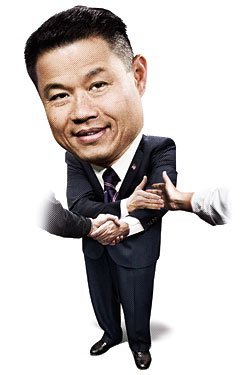
Photo-illustration by DarrowPhoto: Jonathan Fickies/Bloomberg via Getty Images (Liu head); Stan Honda/AFP/Getty Images (Liu legs)
Liu’s manic out-of-office schedule—six events is a light day—also boosts his visibility. The short, sturdy 44-year-old has an intuitive connection with people, whether he is visiting an after-school program for teens or a meeting of black ministers. Part of this appeal is his biography: He’s the hardworking son of Taiwanese immigrants. Part is Liu’s willingness to speak bluntly. Ask him about Occupy Wall Street and Liu says, “This is how revolutions get started. It’s the overall frustration, not just with the economy but with the widening wealth gaps, which I think is a huge problem, the chronic unemployment, and the finger-pointing that goes on. I’ve thought about going down to visit, but I get the sense that they’re also protesting me. That I’m not doing enough. So I think it might be disingenuous for me to go down there.” Liu has tangled, frequently and caustically, with Bloomberg, over the CityTime scandal and expensive contracts for consultants, though last week he and the mayor teamed up to announce a significant restructuring of the city’s pension-investment system. “Bringing more accountability to the school system was a good thing, in the early years of Bloomberg,” Liu says. “Unfortunately, in the later years, it became all about spinning the numbers. I’m not campaigning now. But the sense I get is that people are demanding change. And that is only accentuated by a persistent sentiment that there should not have been a third term, that the law should not have been altered. Everywhere you go, when that topic comes up, people start shaking their heads.”
Voters claim they want a mayor who empathizes—but we’ve elected a take-no-shit candidate five times in a row.
It’s a fine line, though, between spontaneity and sloppiness. While running for comptroller, Liu embellished the hardships of his Taiwanese immigrant parents until the Daily News quoted his parents contradicting the tale. Four days after Liu’s swing through the Bronx, a Times front-page story describes how multiple contributors to Liu’s campaign account either couldn’t be located or didn’t appear to exist; many donated in multiples of eight, a lucky number in Chinese culture. The comptroller promised to clean up any mistakes. The episode wasn’t surprising to political insiders, who have long been rankled by Liu’s mercurial behavior. “But don’t confuse what the insiders say with what the broader electorate sees in him, aspirationally,” one Democratic consultant says. “He represents something that is truly New York, and it’s a story that’s very strong in a Democratic primary.” Liu keeps pushing ahead; one recent night, he dashed from an awards ceremony for Irish labor leaders at the South Street Seaport to another inside the Soho headquarters of SEIU 32BJ, the maintenance workers and doormen’s union whose members are mostly black and Latino, and then on to Chinatown, where he spoke to more than 1,000 immigrants from the Fujian province. It was a journey from New York’s past to its future; Liu is part of that emergence, even if his lapses prevent him from capitalizing on it in 2013.
Liu’s stumbles are a huge gift to Bill de Blasio. Union support helped both gain citywide office in 2009, with De Blasio winning the public advocate’s job. Pivotal players like DC 37, which represents thousands of civil-service workers, and SEIU 1199 probably won’t be torn between the two men in 2013 if Liu’s troubles continue. But no one sees those angles, and a thousand more, better than De Blasio himself. He learned his craft as an aide to Mayor David Dinkins in City Hall and Andrew Cuomo at HUD and as campaign manager for Hillary Clinton’s victorious 2000 run for the U.S. Senate in New York. The next year, De Blasio moved from operative to principal as a city councilman from Park Slope. In 2008, he was one of the loudest City Council voices opposing Bloomberg’s term-limit extension, which became his springboard to winning the 2009 public advocate’s race. De Blasio, at six-foot-five, isn’t too tall to be mayor, by the classic standards of Jimmy Breslin: He has two public-school kids and is at ease in the city’s grittier neighborhoods. Whether De Blasio is too clever is another matter. “At the level of being a political pro, he’s Andrew Cuomo–esque,” says a prominent strategist who knows De Blasio well. “It’s all just chess moves, all day long, every day.”
Yet at this early point in the campaign De Blasio is able to offer the most comprehensive progressive critique of Bloomberg’s legacy. “I think there’s a tremendous desire for an end of the imperial mayoralty,” he says over a salad one October afternoon. “I think the public wants to feel their government is more connected to them.Bloomberg claimed to be staying for the third term to work on the city economy and protect us from the bad national and international economic picture. I will give him credit for capable management of the budget, although I don’t agree with some of the specific decisions. But I see very little that he has done, in terms of economic policy, to maximize job creation in any meaningful way, or to help and protect small businesses that create jobs. And he has been tone-deaf to the growing class disparity in the city. I think a big question for this next era of the city is, how are we going to move forward but not act like anyone has a corner on the market in ideas and can’t be questioned? This last year has felt stuck in a previous era, where you didn’t question elected officials. The fact that the mayor won’t say where he goes on weekends—come on! The president of the United States will say and the mayor won’t?”
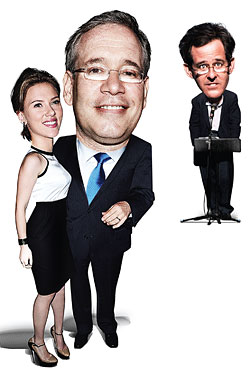
Photo-illustration by DarrowPhoto: Michael Loccisano/Getty Images (Allon); James Devaney/WireImage/Getty Images (Johansson and Stringer); Amy Sussman/Getty Images (Stringer head)
That De Blasio lives in Brooklyn should help his chances—if Liu doesn’t run, De Blasio will be the only outer-borough resident in the field—as does the fact that De Blasio’s wife happens to be Barbadian-American.* His camp also sees opportunity in the absence of a Latino candidate; it’s no accident De Blasio has been featured in several recent stories in El Diario. He’s got plenty of ground to make up, in all languages: A recent Marist poll on 2013 contenders—most meaningful as a measure of name recognition—showed De Blasio in single digits. But at least he was one point ahead of Scott Stringer.
His first fund-raiser tonight was at the Plaza, with tickets going for up to $20,000. Now Stringer has packed the Jane Hotel’s swank lounge with still more paying supporters and hustled his star attraction, actress Scarlett Johansson, into a tiny closet doubling as an office behind a bar. Johansson’s grandmother was a West Side tenant activist and met Stringer when he was an aide to then–State Assemblyman Jerry Nadler. Years later Stringer hired Johansson’s twin brother to work in his office, and tonight she’s repaying the favor. Stringer is grinning so broadly, he seems about to burst out of his blue suit, and minutes later, when he steps to the microphone after ScarJo’s introduction of him as “my candidate for mayor, 2013,” he lets out a bellowing, “Wowwww!” It isn’t long before his core wonk reappears, however, and Stringer is shouting over the noisy crowd about “environmental justice.”
Stringer, the 51-year-old son of a former city councilwoman and the cousin of former congresswoman Bella Abzug, has made the most of the limited powers of the borough president’s office, and he has been very good at raising money, with more than $3 million in the bank. He will be aggressive, whacking Quinn as “Bloomberg four,” and his confidence abounds. “People have tired of a management style that is top-down and less collaborative,” Stringer says. “I think I’m in a unique position, like an Ed Koch, who was at the right moment in time. I’ve demonstrated an ability to work collectively on a lot of controversial issues.” Stringer is the sole Jewish elected official in the field, and his home district on the Upper West Side is a rich source of reliable Democratic voters. But he still needs Quinn or Thompson to falter, because even Manhattan isn’t big enough for three candidates.
And certainly not for four. Tom Allon is the feisty chief executive of Manhattan Media, which publishes community newspapers Our Town and the West Side Spirit. His experiences attending and briefly teaching at Stuyvesant, plus the educational odysseys of his own kids, animate his quest to overhaul the public schools. “I don’t think Bill Thompson has the fire in the belly to be a great mayor,” Allon says. “The flip side is Christine, who I think has all fire and no independence to be a great leader. Herding the cats of the City Council is not like running a company that’s in five boroughs, which I’ve done. I have a real shot to win this thing.” Allon is only 48, but his campaign has a throwback lefty flavor to it—he’s friends with vintage feminist Ronnie Eldridge, he has enlisted sixties Esquire art director George Lois to shoot TV ads, and he wants the city to try a “very Scandinavian” part-time schedule for working parents. Allon is talking with the Liberal Party about running under its banner. “Then even if I don’t come out of the Democratic primary a winner, I’m a force to be reckoned with,” he says. “If there’s somebody who comes out of a bloody Democratic primary, and there’s a Republican, and there’s me, who knows?”
Nobody does, of course. Gentrification and immigration have shuffled the city’s demographics significantly since Bloomberg was first elected, and Allon’s candidacy is one sign of how wide open the race to succeed him will be. Another is the restlessness in the business community. “It is a common conversation among CEOs and businesspeople: Is there a business candidate out there who would step in and make everybody feel comfortable?” one wealthy entrepreneur says. “It can’t be a Wall Street person—that’s the wrong marketing right now. We need a story of someone who is creating jobs in a new sector. All of us are open to finding someone like that, but the name hasn’t come up.” Media and private-equity executive Leo Hindery Jr. is the latest rumored option. “It’s a great job,” the entrepreneur says. “I’m surprised we don’t have a good candidate.”
Many old-school Democrats believe that Bloomberg’s 2001 victory over Mark Green was a terrorist-provoked, money-soaked aberration—that at heart New York is still a righteously liberal, good-government kind of town. Yet the Democratic mayoral losing streak dates back all the way to 1993, when Rudy Giuliani ousted incumbent David Dinkins. Voters claim they want a mayor who empathizes and gives them a hug, but we’ve elected the take-no-shit candidate five times in a row. Maybe the streak gets broken because this time the contest is decided in the left-leaning primary instead of the general election. Tactically, the campaign is most likely to evolve into a contest to see which white candidate faces Thompson in a runoff. But the ultimate winner will be—or should be—whoever constructs the most plausible agenda for a post-Bloomberg city, a plan that sorts the good and bad of school reform, delivers basic services efficiently despite looming deficits, and changes the perception that New York is governed for and by its elites. If somehow the pretenders’ strengths—De Blasio’s cunning, Quinn’s tenacity, Liu’s common touch, Thompson’s calm, Stringer’s policy nerdiness, and Allon’s obsessiveness—could be magically combined into a single candidate, the city would be in good hands come January 1, 2014. Hey, weirder things will happen in the next two years of New York’s political life.
*This article has been corrected to show that Bill de Blasio’s wife is Barbadian-American, not Haitian-American.